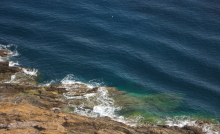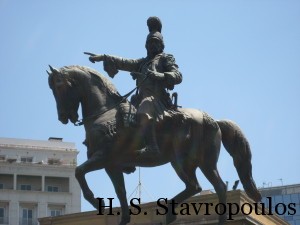I was visiting Greece with my mom in the summer of 1974. On 20 July, we returned to my aunt’s house in Piraeus from a lovely weekend on a nearby island. Just before the ferry boat docked a lone naval officer in full uniform and carrying an attache case jumped over the ramp of the ferry onto the land. Gasps were heard all around me but soon we were caught up in the hustle and bustle of disembarking from the ferry. My cousin and I noticed that unlike other days the usual navy ships were missing and the many sailors coming off boats for shore leave or returning to the ships were absent.
We arrived by taxi several blocks from my aunt and uncle’s house and walked through their working class Piraeus neighborhood. Children played soccer in the streets and in a nearby playground. Then we heard screaming from a neighborhood store. People rushed over, then several ran out and down the street. Parents yelling for the children to come in. The streets and playground deserted. My aunt stopped a woman running by, her face white and tears flowing down it.
Turkey had invaded Cyprus and Greece was at war.
We rushed to my aunt’s house and a neighbor was crying on her porch comforted by other woman. Her son was in the army and she feared for his life. My aunt got us in the house and then she took her wallet and some grocery bags and left. Within twenty minutes she had scoured all the local markets for staples. Flour, olive oil, sugar, eggs, bread, potatoes, canned vegetables and water. She knew what happened in war having survived the Occupation. My aunt emptied out her bags and left again, this time going further out into the surrounding neighborhoods. She came back with more supplies.
Television was government controlled. We left it on with static until the government decided to let the populace know what we were learning from radio stations in Europe.
My uncle came home and told us what news he had learned. He spoke to my mom and I saw her hand over her passport and mine. Then my uncle came to me and said he was taking me to the American Embassy. My aunt and uncle didn’t have a car back then, so we were on my uncle’s motorcycle riding through Piraeus and then through streets in Athens.
The American Embassy in those days was atop a grassy hill overlooking one of the wide thoroughfares in Athens. It looked so majestic and so American. Grass was unheard of in rocky Greece. Today as my uncle and I rode up, it was surrounded by uniformed Greek soldiers. While an embassy is sovereign territory it depends on the host country to protect it.
The soldier told my uncle that only Americans were allowed through their lines. I remember the long walk up the hill as my uncle grew smaller and smaller behind me. I didn’t know how he must have felt to allow his niece out of his protection. I only know how frightened I was leaving him. I reached the entrance and walked in. There was a marine standing guard, an American flag and the seal of America with an eagle in tile in the floor. I didn’t know which one to kiss first.
Embassy personnel, a young man, sat me down in an office and spoke to me. He checked my and my mother’s passports. Took down our information where we were staying, phone numbers and addresses. He calmly gave me the radio frequency of the American station in Athens on a slip of paper. He told me to listen to it continuously because if Americans had to be evacuated that station would provide instructions.
Then he said, “we guarantee your safe passage out of Greece. But your mother is a Greek national under international law and we can only evacuate her if Greece allows her to leave.”
My father had died when I was five. I have no brothers or sisters, no aunts or uncles in the United States. Where was I going to go without my mom. I cried all the way back down the hill and into my uncle’s arms.

